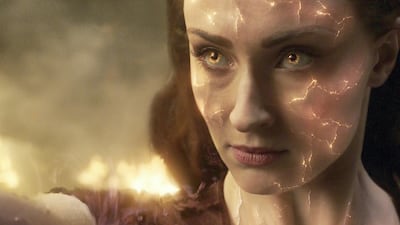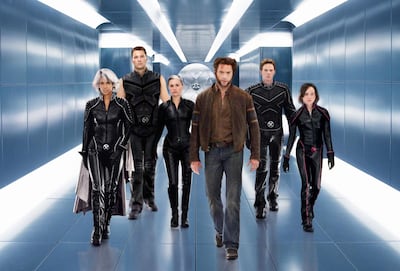To celebrate the imminent arrival of X-Men: Dark Phoenix over Eid, 20th Century Fox declared May 13 "X-Men Day." While the day may have not quite entered the public consciousness to the same degree as New Year's Day, or even Star Wars Day (May the fourth be with you), it did give us an opportunity to see an exclusive selection of footage from the new film at a special screening in Dubai, and try to work out where the much-loved franchise might head next, given that this film is essentially the last one in the series' current format.
We will still be getting X-Men: The New Mutants in 2020, but after that, things are a little unclear. The New Mutants was originally planned as the first in a new spin-off franchise featuring, as the name implies, a new set of X-Men. Corporate world has taken over, however. In March, Disney acquired ownership of 20th Century Fox's parent company, 21st Century Fox, which held the rights to the X-Men franchise.
This meant that the characters became Disney's property, along with all the characters they already held in the main Marvel Cinematic Universe. All X-Men films in development at Fox were consequently put on hold while Disney decided how to integrate its newly acquired Marvel characters into the main MCU, which is itself in a period of transition following the events of Avengers: Endgame.
Deadpool 3 on hold
That means for now, at least, Deadpool 3 and the X-Force spin-off films, as well as the planned New Mutants series and a host of stand-alone movies for characters including Gambit, Shadowcat and Multiple Man, are on the back-burner. Though, it seems unthinkable that we've seen the last of the world's seventh most successful film franchise, and one that was an undeniable influence on the main MCU, after 20 years of success.
Far more likely is that Disney creatives are holding meetings to decide whether to restructure the current slate of films and continue with a separate X-Men franchise, perhaps still operated independently by its Fox subdivision, or wrap the X-Men characters into the sprawling main MCU, where they could have a similar role to the Guardians of the Galaxy – not quite Avengers, but they are there if help is needed, and free to have their own adventures the rest of time.
Did X-Men beget the MCU?
There's a sense in which you could argue that without X-Men, there would be no MCU. You can chart the evolution of the modern superhero film from a number of base points – Tim Burton's 1989 Batman was the first to really take the genre seriously, with a dark, dystopian Gotham City and actual complex characters. Blade pipped X-Men to the title of first Marvel big-screen treatment, and Christopher Nolan's Batman trilogy (2005-2012) gave us the notion of comic book film as high art.
X-Men was unique in its own way, however. It borrowed the darker tone and more rounded characterisation of Burton's movie, introduced social and cultural debate to the genre – the X-Men's treatment as mutants has a lot to say about our treatment of those who are different or "other" in the real world.
The introduction of a wide cast of characters with real relationships, intertwined stories and various attitudes towards their powers and the notion of being a superhero is clearly something that the MCU picked up and ran with to huge success. Like the MCU, you don't have to watch every film in the franchise for an individual chapter to make sense, but if you do watch one in isolation, you'll be missing a lot of unessential, but strangely satisfying, information.
Can X-Men stay relevant?
Whether the X-Men franchise can remain relevant in a post-Endgame world remains to be seen. It has to be said that the footage we watched, while undoubtedly suggesting a perfectly decent film, did seem a little anti-climactic, somehow small-scale after the epic cinematic experience that was Endgame, but that accusation could probably be levelled at any superhero movie viewed so soon after the Avengers cycle came to a close in record-smashing fashion. Let's be honest, even Infinity War seemed small-scale next to Endgame's bombast.
If anyone can successfully make sure the X-Men do remain relevant, it's surely Kevin Feige and the MCU team, and let's not forget that the MCU doesn't have to be epically bombastic to succeed, nor focus on the best-known characters – Ant-Man and Guardians of the Galaxy, among the most entertaining instalments in the series, are proof of that.
What do we know about Dark Phoenix?
The footage from the coming film doesn't give much away about what we can expect in the future, but why would it? Dark Phoenix was written and shot before the Disney takeover even took place. However, there does seem to be a sense of finality, of passing the baton in what we saw.
We can't give too much away in terms of plot spoilers, but as expected, Jean Grey transforms into some kind of all-powerful being following an encounter with a solar flare, and goes rogue, forcing Professor X's X-Men and Magneto's Brotherhood of Mutants to put aside their differences and unite against her.
It's actually a plot that's been covered before, in 2006's The Last Stand. Though given 2014's time-travelling Days of Future Past essentially destroyed the chronology of that film, it technically hasn't been covered before in the current X-Men timeline.
Now it’s the “days of future future” that are in the balance, so since we can’t second guess Disney’s next move, let’s look forward to one final movie in the series while we wait with bated breath for Disney’s next announcement.


